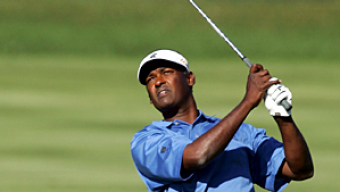PONTE VEDRA BEACH, Florida — Vijay Singh sued the PGA Tour on Wednesday, a week after his doping case was dropped, claiming it damaged his reputation by not doing a thorough job of researching his use of deer antler spray.
“I am proud of my achievement, my work ethic and the way I live my life,” Singh said in a statement. “The PGA TOUR not only treated me unfairly, but displayed a lack of professionalism that should concern every professional golfer and fan of the game.”
Singh filed the lawsuit in New York, where he has a home and the PGA Tour has an office.
The 50-year-old Fijian said in a Sports Illustrated article in January that he used deer antler spray, which was said to include an insulin-like growth hormone that was on the PGA Tour’s list of banned substances. The PGA Tour sent a sample from Singh to be tested, and it returned small amounts of the IGF-1 chemical.
The lawsuit said the PGA Tour notified Singh on Feb. 19 that he was to be suspended for 90 days. Singh appealed. Last week, Commissioner Tim Finchem said the PGA Tour was dropping its case based on new information from the World Anti-Doping Agency. He said WADA informed the PGA Tour that using deer antler spray was no longer prohibited because it contains such minimal amounts of IGF-1.
The lawsuit said the PGA Tour relied on WADA’s list of banned substances and methods without doing any of its own research, including whether such substances even provide any performance-enhancing benefits.
“We have not seen the lawsuit, just the statement,” PGA Tour spokesman Ty Votaw said. “We have no comment.”
The lawsuit also said the PGA Tour held Singh’s earnings in escrow during his appeal. Singh earned $99,980 from five tournaments. The suit seeks unspecified damages.
“He’s looking to reclaim his reputation and hold the Tour accountable for acting irresponsible,” said Jeffrey Rosenblum, one of Singh’s lawyers. “He’s concerned about his reputation. There should never be an asterisk next to Vijay’s name.”
Rosenblum also represented Doug Barron, the only player suspended under the PGA Tour’s anti-doping policy. Barron sued the PGA Tour, and the case was settled.
Peter Ginsberg, a sports law specialist and lead attorney in the lawsuit, said the PGA Tour never bothered to analyze the trace amounts of IGF-1 in the bottle.
“What the PGA Tour accused Vijay of spraying was not a banned substance,” Ginsberg said. “It was an inactive substance and could not possibly have any effect, good or bad, on Vijay. And that’s something the PGA Tour easily could have determined.”
Singh has made over $67 million on the PGA Tour, which he joined in 1993. He once was banned by the Asian Tour in 1985 for allegations that he changed his score to make the cut. Singh recovered from that incident to earn his card on the European Tour, and then bring his game to America, where he reached No. 1 in the world.
Singh has won the Masters and the PGA Championship among his 34 PGA Tour victories. His best year was in 2004, when he won nine times. Singh has not won since the Deutsche Bank Championship in September 2008, two months after the PGA Tour’s anti-doping program was launched.
The lawsuit was filed the week of THE PLAYERS Championship, the PGA Tour’s flagship event at its headquarters next to the TPC Sawgrass. Singh is in the field. He has not spoken to reporters all year.
The lawsuit included a Feb. 14 report from the University of California Los Angeles lab to which the tour sent the sample of deer antler spray. It claims that while the lab identified IGF-1 in the bottle of spray, it did not test to see if it was an inactive substance or whether it was in a way that could have helped Singh.
It said the UCLA report determined there was 60 nanograms of IGF-1 per milliliter, which was .00006 the strength of IGF-1 on the banned list. The lawsuit said it was comparable to taking a shot of bourbon, pouring it into an Olympic-size swimming pool, and then drinking a shot of the pool water.
The lawsuit also revealed that it was Singh’s caddie, Tony Shepherd, who recommended “The Ultimate Spray” to help the Fijian’s knee and back problems. Shepherd told Singh he used the spray and arranged for Singh to meet with Mitch Ross, owner of “Sports with Alternatives to Steroids,” who told Singh the products were all natural and did not contain banned substances.
The lawsuit said Singh took the spray orally for about a month during the offseason. It said Ross asked Singh to talk to a Sports Illustrated reporter doing a story on the company, and Singh agreed.





















